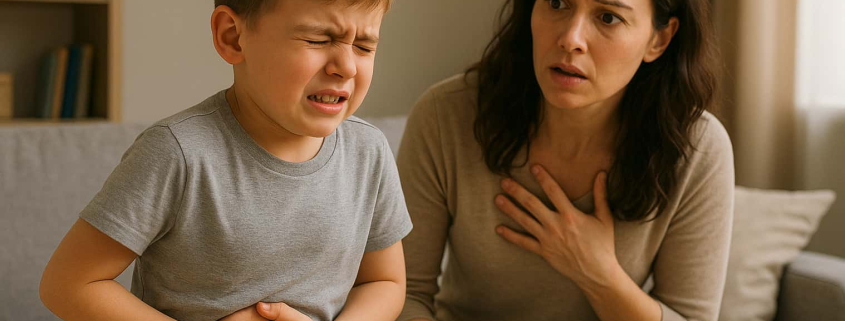How Many Days of Diarrhea in Children Is Concerning?
Diarrhea is a common problem in children. While most episodes are mild and resolve on their own, it’s important to know when to seek medical advice.
Answering this question isn’t simple, since several factors can affect how long diarrhea lasts. In general, acute diarrhea in children improves within 5 to 7 days, and in most cases should not last more than 2 weeks.
Warning Signs of Diarrhea in Children
Up to 48–72 hours: The key is to keep your child hydrated and observe how symptoms evolve. If they have many stools, are vomiting, or show signs of dehydration, call your pediatrician.
After 3–4 days without improvement (or with vomiting): Ask for a medical evaluation.
Beyond 7 days: This is not typical of most viral gastroenteritis. A basic lab study (stool culture, parasites, etc.) is recommended.
Beyond 14 days: Considered persistent/chronic diarrhea. Conditions like lactose or fructose intolerance, celiac disease, bacterial overgrowth, parasites, or inflammatory disease should be ruled out.
Common Causes of Diarrhea Without Fever in Children
Diarrhea can be worrying for parents, especially when there’s no fever. The absence of fever often points to less severe causes, but it’s still important to understand the different triggers.
A child’s emotional wellbeing is closely linked to their digestive health. Stress from school, exams, or family changes (such as moving house, the arrival of a new sibling, or conflicts at home) can directly impact the digestive system.
1) Diet and Nutrition Factors
Toddler’s Diarrhea (Chronic Nonspecific Diarrhea): Common in children ages 1–3. Stools are loose, often containing undigested food, occurring several times a day.
Too much juice (sorbitol and fructose act as natural laxatives).
Low fat intake (can speed up bowel movements).
Excessive fluid consumption throughout the day (dilutes digestive juices).
Solution: Limit juice, prioritize water and milk, and modestly increase healthy fats (avocado, vegetable oils, nut butters in older kids).
Food Intolerances and Allergies:
Lactose intolerance: diarrhea, gas, and stomach pain after dairy.
Fructose intolerance: trouble absorbing fructose in fruit, some vegetables, or sweeteners.
Cow’s milk protein allergy (CMPA): diarrhea, rash, vomiting, etc.
Celiac disease: immune reaction to gluten in wheat, barley, rye, oats.
Always consult a pediatrician before starting any restrictive diet.
2) Illnesses and Infections
Viral Infections: Rotavirus, norovirus, adenovirus. Often cause watery diarrhea, sometimes with mild vomiting or abdominal pain. May last 5–7 days, sometimes up to 2 weeks. Fever may be absent or short-lived.
Post-Antibiotic Diarrhea: Antibiotics can disrupt the gut microbiota, leading to loose stools for days or weeks after treatment. Fever is usually absent. Sometimes probiotics may help.
3) Irritable Bowel Syndrome (IBS):
Children with IBS may have stress-triggered diarrhea episodes that alternate with normal stools or constipation. Emotional support, relaxation techniques, and, in some cases, mental health support can be helpful.
When to Seek Medical Care for Diarrhea
Call a doctor if your child shows any of these signs:
High or persistent fever (above 39°C / 102°F, or lasting more than 48 hours).
Signs of dehydration: not urinating for 8–12 hours, very dry mouth, sunken eyes, no tears when crying, unusual tiredness.
Blood or large amounts of mucus in stools with severe abdominal pain.
Persistent vomiting and inability to keep fluids down.
Infants under 6 months, or children with chronic conditions (diabetes, heart or kidney disease, immune disorders) are at higher risk and should be monitored closely.
Managing Diarrhea at Home
Hydration with Oral Rehydration Solutions (ORS): Offer frequent small sips. If vomiting, give teaspoons every 5–10 minutes. Avoid sodas, energy drinks, or fruit juices. Continue breastfeeding on demand.
Normal Diet: No strict “bland diet” is needed. Offer familiar, easy-to-digest foods (rice, potatoes, ripe banana, yogurt, chicken/fish, soft vegetables). Follow your child’s appetite.
Probiotics (with evidence): Certain strains like Lactobacillus rhamnosus GG or Saccharomyces boulardii may shorten diarrhea by about a day. Ask your pediatrician for guidance.
Hygiene: Wash hands after diaper changes or using the bathroom. Keep children home from school until at least 48 hours after their last episode.
Can Children Take Anti-Diarrheal Medicines?
We don’t recommend giving anti-diarrheal medications without medical advice.
Loperamide is not suitable for children under 12, and should never be used if there is fever or blood in stools. It may be used only in select adolescent cases under strict medical guidance.
How Our Home Pediatric Gastroenterology Team Can Help
Our goal is for your child to recover quickly and safely, with as little stress as possible for the whole family. Our pediatric gastroenterology specialists in Madrid can help by:
Assessing your child at home, avoiding ER trips and unnecessary exposure.
Creating a personalized hydration and nutrition plan based on age and situation.
Recommending safe probiotics or other treatments when appropriate.
Coordinating stool sample collection and basic lab tests if needed.
Providing close follow-up in the first 24–48 hours to adjust care as necessary.


